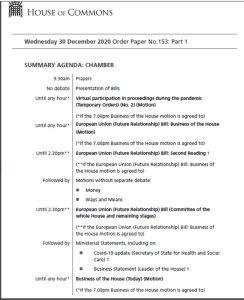5th January 2021
Another lockdown in England and the other constituent nations of the United Kingdom.
Another dollop of regulations containing restrictions backed by criminal sanctions, and another dollop of governmental guidance and ministerial exhortations.
This is the third national lockdown in England, and the sound of the official starting whistle is now familiar.
Will it work?
And if not, why not?
*
If the lockdown is to work, it will not be by law alone.
As this blog has previously averred, law is not magic, and regulations are not spells.
It does not matter how solemn the law-making ceremony is, and how solemnly the laws are then pronounced.
To have effect any laws need to be clear, comprehensible, and accessible.
And this has been the fault now, for over a year, with the coronavirus regulations – they are difficult to find, at least in their up-to-date and consolidated form, and impossible for a non-lawyer to follow.
Indeed, it is rumoured that there is only one person – Adam Wagner, a barrister in London – who has read and understood all the legal instruments enacted over the last year in England.
(I happen to be an experienced former government lawyer, trained in drafting statutory instruments, and with a speciality in public law and an understanding of emergency legislation – and I gave up trying to keep on top of the ever-changing increasingly complicated lump of coronavirus legislation last Autumn.)
And if the laws are not clear, comprehensible, and accessible, then – regardless of any other factor – law-making is a futile exercise.
More than mere law is needed.
*
The second thing that is needed is enforcement.
Criminal laws that are not enforced are official fictions.
They are nothing more than the sort of item you get on those lists you see from time to time, of ridiculous laws from yesteryear that are still nominally in force but ignored.
And for criminal laws to be enforced, there needs to be be resources and an understanding of the law by those entrusted to enforce the law.
There also needs to be a working criminal justice system.
And there is little evidence of there being resources in place for laws to be enforced either by by police or by the courts.
Without credible enforcement, it does not matter if you keep increasing the supposed penalties to incredible amounts – like some Dr Evil boasting of a ransom of one million dollars.
https://www.youtube.com/watch?v=M63C14437rQ
But more than enforcement is needed.
With a challenge of the sheer scale of a pandemic, only a totalitarian state could perhaps rely on laws and enforcement alone
*
For the lockdown to work in a modern non-totalitarian society, there needs to be consent.
In essence: laws and sanctions should only have any effect at the margins, because the mass of the people will do the ‘right thing’ anyway.
And this engages the normative issues of legitimacy, accountability, fairness, and credibility.
There cannot be one law for the many, and another for those who go on day trips to Barnard Castle.
There cannot be one law on a Monday, allowing children to go back to school after the Christmas vacation, and then suddenly another law on the Tuesday.
There cannot be a demand for schools to be closed, just days after the government was – literally – threatening a council with a High Court mandatory injunction so as to keep schools open.
There cannot be many things – that is if a government genuinely wants to be taken seriously in imposing a lockdown.
*
But even laws and sanctions, resources and enforcement, and consent and credibility, are not enough if the underlying policy is not sound – or seen to be sound.
And this is also a challenge for this government.
The fundamental mistake with government policy on coronavirus, as with Brexit, is that it has approached something complex as if it were quick and easy, and ministers have kept preferring crowd-pleasing gestures to dealing with the problems that they put-off.
Most of the problems of Brexit policy, and many of the problems in coronavirus policy, were foreseeable and foreseen.
Ministers were told at the time.
But ministers shrugged, and made the mistakes anyway.
Unless there is sound policy in place, blowing the official whistle for another lockdown – with all the paraphernalia of laws and guidance, and ministerial broadcasts – will not work, and cannot work.
Ministers need to get policy right – and then other benefits will follow.
This is the rub – ministers keep shrugging and crowd-pleasing and getting policy wrong, because they know they can get away with it.
In other words: ministers know that a sufficient number of voters do not care enough whether politicians are candid and competent on coronavirus, as with other things.
And so until a sufficient number of voters do care that politicians are candid and competent, we are likely to keep on hearing the whistle sound of bad policy-making and implementation, and for as long as the pandemic persists.
*****
If you value the free-to-read and independent legal and policy commentary please do support through the Paypal box above.
Suggested donation of any amount as a one-off, £1 upwards per post found useful or valuable, or £4.50 upwards on a monthly profile.
This law and policy blog provides a daily post commenting on and contextualising topical law and policy matters – each post is published at about 9.30am UK time.
Each post takes time, effort, and opportunity cost.
Or become a Patreon subscriber.
You can also subscribe to this blog at the subscription box above (on an internet browser) or on a pulldown list (on mobile).
*****
Comments Policy
This blog enjoys a high standard of comments, many of which are better and more interesting than the posts.
Comments are welcome, but they are pre-moderated.
Comments will not be published if irksome.

















